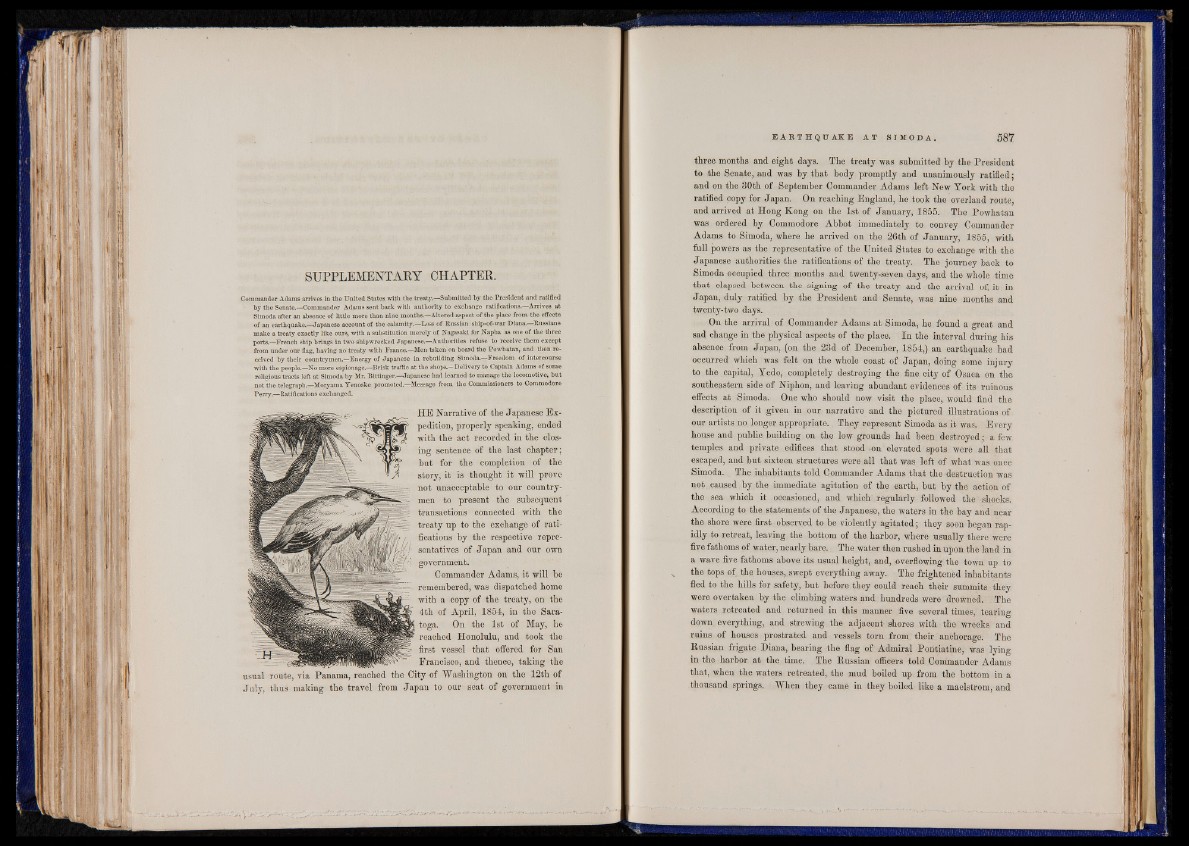
SUPPLEMENTARY CHAPTER.
Commander Adams arrives in the United States with the treaty.—-Submitted by the President and ratified
by the Senate.—Commander Adams sent back with authority to exchange ratifications.—Arrives at
Simoda after an absence of little more than nine months.—Altered aspect of the place from the effects
of an earthquake.—Japanese account of the calamity.—Loss of Russian ship-of-war Diana.—Russians
make a treaty exactly like ours, with a substitution merely of Nagasaki for Napha as one o f the three
ports.—French ship brings in two shipwrecked Japanese.—Authorities refuse to receive them except
from under our flag, having no treaty with France.—Men taken on board the Powhatan, and then received
by their countrymen.—Energy of Japanese in rebuilding Simoda.—Freedom of intercourse
with the people.—No more espionage.—Brisk traffic at the shops.— Delivery to Captain Adams of some
religious tracts left at Simoda by Mr. Bittinger.—Japanese had learned to manage the locomotive, b u t
not the telegraph.—Moryama Yenoske promoted.—Message from the Commissioners to Commodore
Perry.—Ratifications exchanged.
HE Narrative of the Japanese Expedition,
properly speaking, ended
with the act recorded in the closing
sentence of the last chapter ;
hut for the completion of the
story, it is thought it will prove
not unacceptable to our countrymen
to present the subsequent
transactions connected with the
treaty up to the exchange of ratifications
by the respective representatives
of Japan and our own
government.
Commander Adams, it will be
remembered, was dispatched home
with a copy of the treaty, on the
4th of April, 1854, in the Saratoga.
On the 1st of May, he
reached Honolulu, and took the
first vessel that offered for San
Erancisco, and thence, taking the
usual route, via Panama, reached the City of Washington on the 12th of
July, thus making the travel from Japan to our seat of government in
three months and eight days. The treaty was submitted by the President
to the Senate, and was by that body promptly and unanimously ratified ;
and on the 30th of September Commander Adams left New York with the
ratified copy for Japan. On reaching England, he took the overland route,
and arrived at Hong Kong on the 1st of January, 1855. The Powhatan
was ordered by Commodore Abbot immediately to convey Commander
Adams to Simoda, where he arrived on the 26th of January, 1855, with
full powers as the representative of the United States to exchange with the
Japanese authorities the ratifications of the treaty. The journey back to
Simoda occupied three months and twenty-seven days, and the whole time
that elapsed between the signing of the treaty and the arrival of. it in
Japan, duly ratified by the President and Senate, was nine months and
twenty-two days.
On the arrival of Commander Adams at Simoda, he found a great and
sad change in the physical aspects of the place. In the interval during his
absence from Japan, (on the 23d of December, 1854,) an earthquake had
occurred which was felt on the whole coast of Japan, doing some injury
to the capital, Yedo, completely destroying the fine, city of Osaea on the
southeastern side of Niphon, and leaving abundant evidences of its ruinous
effects at Simoda. One who should now visit the place, would find the
description of it given in our narrative and the pictured illustrations of
our artists no longer appropriate. They represent Simoda as it was. Every
house and public building on the low grounds had been destroyed; a few
temples and private edifices that stood-on elevated spots were all that-
escaped, and but sixteen structures were all that was left of what was once
Simoda. The inhabitants told Commander Adams that the destruction was
not caused by the immediate agitation of the earth, but by the! action of
the sea which it occasioned, and which regularly followed the -shocks.
According to the statements of the Japanese, the waters in the bay and near
the shore were first observed to be violently agitated; they soon began rapidly
to retreat, leaving the bottom of the harbor, where usually there were
five fathoms of water, nearly bare. The water then rushed in upon the land in
a wave five fathoms above its usual height, and, overflowing the town up to
the tops of, the houses, swept everything away. The frightened inhabitants
fled to the hills for safety, but before they could reach their summits they
were overtaken by the climbing waters and hundreds were drowned. The
waters retreated and returned in this manner five several times, tearing
down everything, and strewing the adjacent shores with the wrecks and
ruins of houses prostrated and vessels torn from their anchorage. The
Russian frigate Diana, bearing the flag of Admiral Pontiatine, was lying
in the harbor at the time. The Russian officers told Commander Adams
that, when the waters retreated, the mud boiled up from the bottom in a
thousand springs. " W h e n they came in they boiled like a maelstrom, and